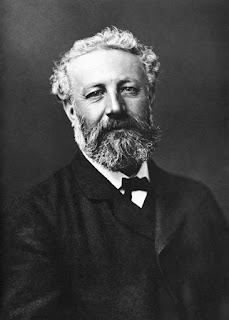Novelist Jules Verne,
whose science fiction foretold the submarine, the dirigible, the steamship, the
gas-powered automobile, glass skyscrapers, calculators, and the mile-a-minute
train, died bitterly frustrated that he was repeatedly passed over for
membership in the Academie Française, a lifelong goal. The second most
translated author in history (after Agatha Christie), he entered into a
contract early in his career to turn out two books a year for his publisher,
Pierre-Jules Hetzel, for 20,000 francs a year (about $100,000 today), and even
though his books sales were in the millions, he stuck to this agreement until
his death at age seventy-seven from complications of diabetes.
Verne was born February 8,
1828, in Nantes, in the northwest of France, to a Catholic family headed by a
lawyer noted for his piety. He was sent to a series of religious schools, and
then took a bachelor’s degree at Rennes, earning the grade “fairly good.” His
father insisted that Jules should follow him in a law career, but he soon
abandoned it to write novels and plays and mingle with the literati in Paris,
where Victor Hugo and Alexandre Dumas fils were his friends and idols.
In 1856 Verne was in a
friend’s wedding in Amiens, where he met and fell in love with the bride’s
sister, Honorine Viane de Morel. They were married the following year, and
Verne accepted an offer from her brother to work in his brokerage firm, rising
early every morning to continue his writing. In 1862 he met and began his
lifelong association with the publisher Hetzel, turning out such popular
adventure novels as Around the World in
Eighty Days, Twenty Thousand Leagues Under the Sea, Journey to the Center of
the Earth, From the Earth to the Moon, and dozens more.
Verne was made a commander
of the Legion of Honor, but although the Academie Française honored several of
his novels, it declined to admit him to the august body of forty literary
immortals. (Verne was in good company outside the Academie; other French
writers who failed to make the cut include Molière, René Descartes, Jean-Jacques Rousseau,
Honoré de Balzac, Gustave Flaubert, Émile Zola, Marcel Proust, and Jean-Paul
Sartre.)
Despite his thorough
Catholic upbringing, Verne became a Deist in his forties, hewing to a belief in
a rational creator, but without the trappings of orthodox Christian dogma.
Verne suffered from illness for much of his life. When he was thirty-two he had an attack of facial paralysis, for which he received electric treatments. Five years later he had another such attack, which was not so readily alleviated and he suffered greatly from it. He developed diabetes, which contributed to a variety of ailments, including hypertension, ringing of the ears, frequent dizziness, spasmodic colitis, aerophagia (excessive swallowing of air, causing bloating, belching, and flatulence), and increasingly severe cataracts that left him nearly blind.
In 1886 Verne’s psychotic nephew Gaston tried to kill him, but instead shot him in the ankle, resulting in an infection which caused him to limp for the rest of his life. His worsening stomach problems led him to adopt a diet exclusively of dairy products and eggs, of which he observed, “Living on a diet of milk and eggs, I feel neither good nor bad, ovarian, lactarian, or even vegetarian.”
Diabetes caught up with Verne in March of 1905, and he had a stroke that paralyzed the left side of the body. He lingered for a couple of weeks at his home in Amiens and died on March 24, at 3:10 p.m. with his family at his side. Newspaper accounts of his death reported that he remained conscious till the end and even calmly discussed his imminent departure from life. His sister Marie's account of his last moments is somewhat different:
“He
could not say anything coherently, and it became apparent that this was indeed
the end. The paralysis was spreading, and…he was no longer our brother and his
beautiful intelligence was no longer there; there was nothing but a body and a
slowly departing soul. In short, our poor Jules has succumbed to diabetes that
we were not monitoring. Last year, he suffered a bad episode, but after
recovering, we thought no more about it. Although his wife looked after him
admirably, she did let him do whatever he wanted.”
He is buried in La
Madeleine Cemetery in Amiens.
Photo by Felix Nadar

Thanks for this post. Verne is one of my favourite writers, and it's interesting to learn about the man behind the author.
ReplyDelete